Volkswagen Case Study: Ethical Analysis of the Diesel Emission Scandal
VerifiedAdded on 2020/10/05
|11
|2535
|119
Report
AI Summary
This report examines the Volkswagen diesel emission scandal, focusing on corporate ethics and its implications. The analysis delves into the key issues, including the use of "defeat devices" to cheat emission tests, and explores the ethical theories of consequentialism, utilitarianism, and ethical egoism to understand VW's actions. It assesses the economic impact of the scandal, including financial losses and damage to brand image. The report concludes that VW's unethical practices led to significant environmental and reputational damage, emphasizing the importance of ethical guidelines. Recommendations include embedding corporate social responsibilities, promoting environmental awareness, clearly articulating values and ethics, and restructuring the supervisory board to ensure ethical practices and prevent future misconduct. The report highlights the long-term consequences of unethical behavior and the steps required to regain stakeholder trust.
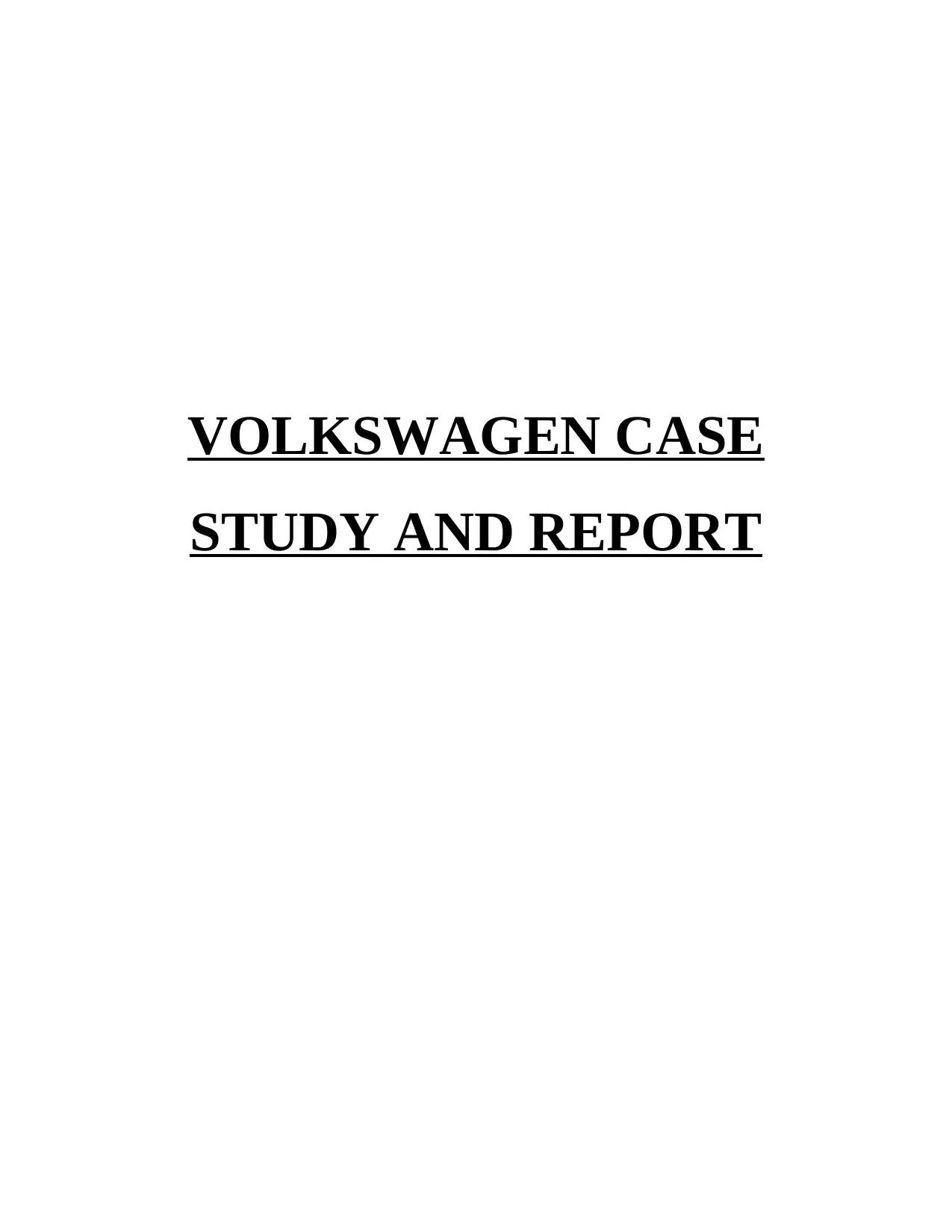
VOLKSWAGEN CASE
STUDY AND REPORT
STUDY AND REPORT
Paraphrase This Document
Need a fresh take? Get an instant paraphrase of this document with our AI Paraphraser

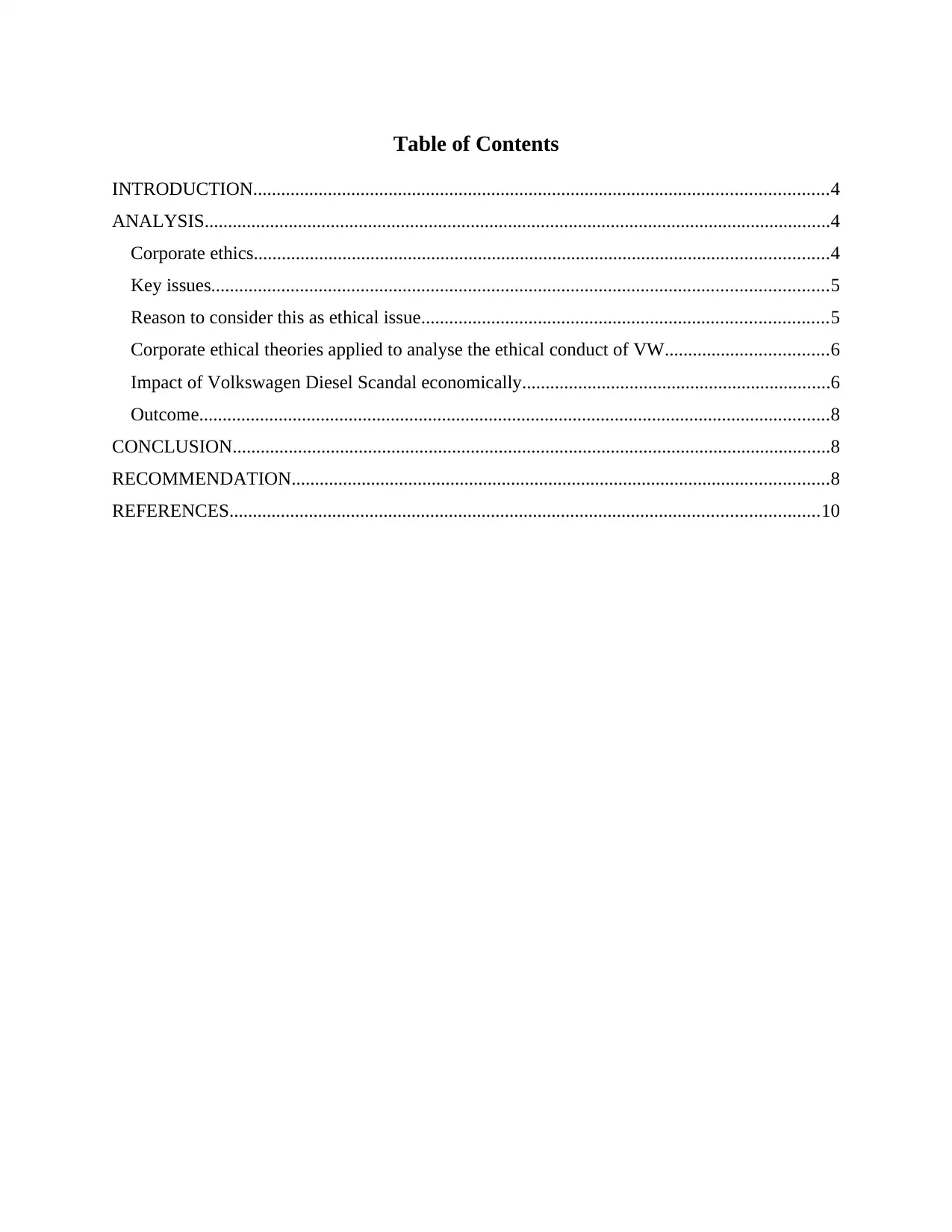
Table of Contents
INTRODUCTION...........................................................................................................................4
ANALYSIS......................................................................................................................................4
Corporate ethics...........................................................................................................................4
Key issues....................................................................................................................................5
Reason to consider this as ethical issue.......................................................................................5
Corporate ethical theories applied to analyse the ethical conduct of VW...................................6
Impact of Volkswagen Diesel Scandal economically..................................................................6
Outcome.......................................................................................................................................8
CONCLUSION................................................................................................................................8
RECOMMENDATION...................................................................................................................8
REFERENCES..............................................................................................................................10
INTRODUCTION...........................................................................................................................4
ANALYSIS......................................................................................................................................4
Corporate ethics...........................................................................................................................4
Key issues....................................................................................................................................5
Reason to consider this as ethical issue.......................................................................................5
Corporate ethical theories applied to analyse the ethical conduct of VW...................................6
Impact of Volkswagen Diesel Scandal economically..................................................................6
Outcome.......................................................................................................................................8
CONCLUSION................................................................................................................................8
RECOMMENDATION...................................................................................................................8
REFERENCES..............................................................................................................................10
⊘ This is a preview!⊘
Do you want full access?
Subscribe today to unlock all pages.

Trusted by 1+ million students worldwide

Paraphrase This Document
Need a fresh take? Get an instant paraphrase of this document with our AI Paraphraser
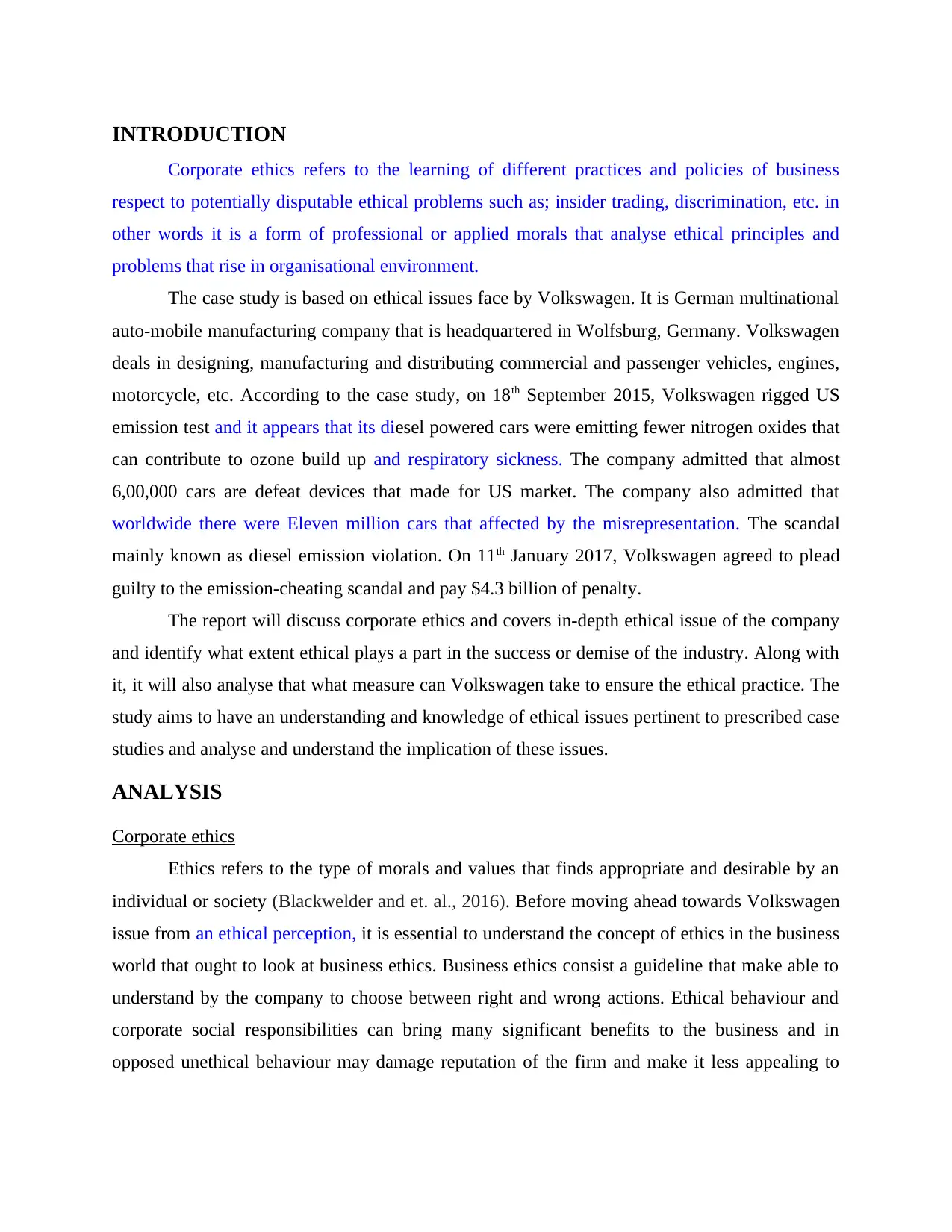
INTRODUCTION
Corporate ethics refers to the learning of different practices and policies of business
respect to potentially disputable ethical problems such as; insider trading, discrimination, etc. in
other words it is a form of professional or applied morals that analyse ethical principles and
problems that rise in organisational environment.
The case study is based on ethical issues face by Volkswagen. It is German multinational
auto-mobile manufacturing company that is headquartered in Wolfsburg, Germany. Volkswagen
deals in designing, manufacturing and distributing commercial and passenger vehicles, engines,
motorcycle, etc. According to the case study, on 18th September 2015, Volkswagen rigged US
emission test and it appears that its diesel powered cars were emitting fewer nitrogen oxides that
can contribute to ozone build up and respiratory sickness. The company admitted that almost
6,00,000 cars are defeat devices that made for US market. The company also admitted that
worldwide there were Eleven million cars that affected by the misrepresentation. The scandal
mainly known as diesel emission violation. On 11th January 2017, Volkswagen agreed to plead
guilty to the emission-cheating scandal and pay $4.3 billion of penalty.
The report will discuss corporate ethics and covers in-depth ethical issue of the company
and identify what extent ethical plays a part in the success or demise of the industry. Along with
it, it will also analyse that what measure can Volkswagen take to ensure the ethical practice. The
study aims to have an understanding and knowledge of ethical issues pertinent to prescribed case
studies and analyse and understand the implication of these issues.
ANALYSIS
Corporate ethics
Ethics refers to the type of morals and values that finds appropriate and desirable by an
individual or society (Blackwelder and et. al., 2016). Before moving ahead towards Volkswagen
issue from an ethical perception, it is essential to understand the concept of ethics in the business
world that ought to look at business ethics. Business ethics consist a guideline that make able to
understand by the company to choose between right and wrong actions. Ethical behaviour and
corporate social responsibilities can bring many significant benefits to the business and in
opposed unethical behaviour may damage reputation of the firm and make it less appealing to
Corporate ethics refers to the learning of different practices and policies of business
respect to potentially disputable ethical problems such as; insider trading, discrimination, etc. in
other words it is a form of professional or applied morals that analyse ethical principles and
problems that rise in organisational environment.
The case study is based on ethical issues face by Volkswagen. It is German multinational
auto-mobile manufacturing company that is headquartered in Wolfsburg, Germany. Volkswagen
deals in designing, manufacturing and distributing commercial and passenger vehicles, engines,
motorcycle, etc. According to the case study, on 18th September 2015, Volkswagen rigged US
emission test and it appears that its diesel powered cars were emitting fewer nitrogen oxides that
can contribute to ozone build up and respiratory sickness. The company admitted that almost
6,00,000 cars are defeat devices that made for US market. The company also admitted that
worldwide there were Eleven million cars that affected by the misrepresentation. The scandal
mainly known as diesel emission violation. On 11th January 2017, Volkswagen agreed to plead
guilty to the emission-cheating scandal and pay $4.3 billion of penalty.
The report will discuss corporate ethics and covers in-depth ethical issue of the company
and identify what extent ethical plays a part in the success or demise of the industry. Along with
it, it will also analyse that what measure can Volkswagen take to ensure the ethical practice. The
study aims to have an understanding and knowledge of ethical issues pertinent to prescribed case
studies and analyse and understand the implication of these issues.
ANALYSIS
Corporate ethics
Ethics refers to the type of morals and values that finds appropriate and desirable by an
individual or society (Blackwelder and et. al., 2016). Before moving ahead towards Volkswagen
issue from an ethical perception, it is essential to understand the concept of ethics in the business
world that ought to look at business ethics. Business ethics consist a guideline that make able to
understand by the company to choose between right and wrong actions. Ethical behaviour and
corporate social responsibilities can bring many significant benefits to the business and in
opposed unethical behaviour may damage reputation of the firm and make it less appealing to
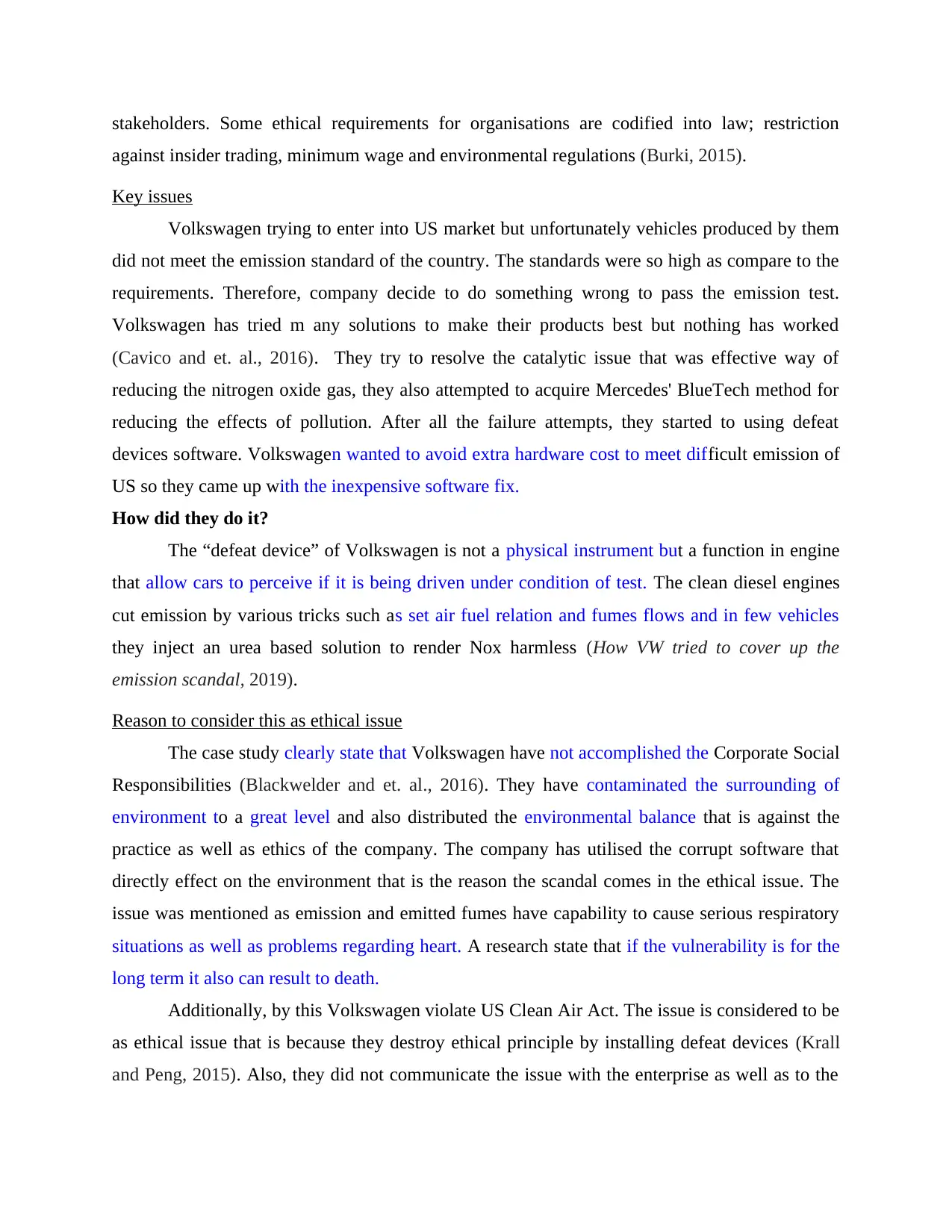
stakeholders. Some ethical requirements for organisations are codified into law; restriction
against insider trading, minimum wage and environmental regulations (Burki, 2015).
Key issues
Volkswagen trying to enter into US market but unfortunately vehicles produced by them
did not meet the emission standard of the country. The standards were so high as compare to the
requirements. Therefore, company decide to do something wrong to pass the emission test.
Volkswagen has tried m any solutions to make their products best but nothing has worked
(Cavico and et. al., 2016). They try to resolve the catalytic issue that was effective way of
reducing the nitrogen oxide gas, they also attempted to acquire Mercedes' BlueTech method for
reducing the effects of pollution. After all the failure attempts, they started to using defeat
devices software. Volkswagen wanted to avoid extra hardware cost to meet difficult emission of
US so they came up with the inexpensive software fix.
How did they do it?
The “defeat device” of Volkswagen is not a physical instrument but a function in engine
that allow cars to perceive if it is being driven under condition of test. The clean diesel engines
cut emission by various tricks such as set air fuel relation and fumes flows and in few vehicles
they inject an urea based solution to render Nox harmless (How VW tried to cover up the
emission scandal, 2019).
Reason to consider this as ethical issue
The case study clearly state that Volkswagen have not accomplished the Corporate Social
Responsibilities (Blackwelder and et. al., 2016). They have contaminated the surrounding of
environment to a great level and also distributed the environmental balance that is against the
practice as well as ethics of the company. The company has utilised the corrupt software that
directly effect on the environment that is the reason the scandal comes in the ethical issue. The
issue was mentioned as emission and emitted fumes have capability to cause serious respiratory
situations as well as problems regarding heart. A research state that if the vulnerability is for the
long term it also can result to death.
Additionally, by this Volkswagen violate US Clean Air Act. The issue is considered to be
as ethical issue that is because they destroy ethical principle by installing defeat devices (Krall
and Peng, 2015). Also, they did not communicate the issue with the enterprise as well as to the
against insider trading, minimum wage and environmental regulations (Burki, 2015).
Key issues
Volkswagen trying to enter into US market but unfortunately vehicles produced by them
did not meet the emission standard of the country. The standards were so high as compare to the
requirements. Therefore, company decide to do something wrong to pass the emission test.
Volkswagen has tried m any solutions to make their products best but nothing has worked
(Cavico and et. al., 2016). They try to resolve the catalytic issue that was effective way of
reducing the nitrogen oxide gas, they also attempted to acquire Mercedes' BlueTech method for
reducing the effects of pollution. After all the failure attempts, they started to using defeat
devices software. Volkswagen wanted to avoid extra hardware cost to meet difficult emission of
US so they came up with the inexpensive software fix.
How did they do it?
The “defeat device” of Volkswagen is not a physical instrument but a function in engine
that allow cars to perceive if it is being driven under condition of test. The clean diesel engines
cut emission by various tricks such as set air fuel relation and fumes flows and in few vehicles
they inject an urea based solution to render Nox harmless (How VW tried to cover up the
emission scandal, 2019).
Reason to consider this as ethical issue
The case study clearly state that Volkswagen have not accomplished the Corporate Social
Responsibilities (Blackwelder and et. al., 2016). They have contaminated the surrounding of
environment to a great level and also distributed the environmental balance that is against the
practice as well as ethics of the company. The company has utilised the corrupt software that
directly effect on the environment that is the reason the scandal comes in the ethical issue. The
issue was mentioned as emission and emitted fumes have capability to cause serious respiratory
situations as well as problems regarding heart. A research state that if the vulnerability is for the
long term it also can result to death.
Additionally, by this Volkswagen violate US Clean Air Act. The issue is considered to be
as ethical issue that is because they destroy ethical principle by installing defeat devices (Krall
and Peng, 2015). Also, they did not communicate the issue with the enterprise as well as to the
⊘ This is a preview!⊘
Do you want full access?
Subscribe today to unlock all pages.

Trusted by 1+ million students worldwide
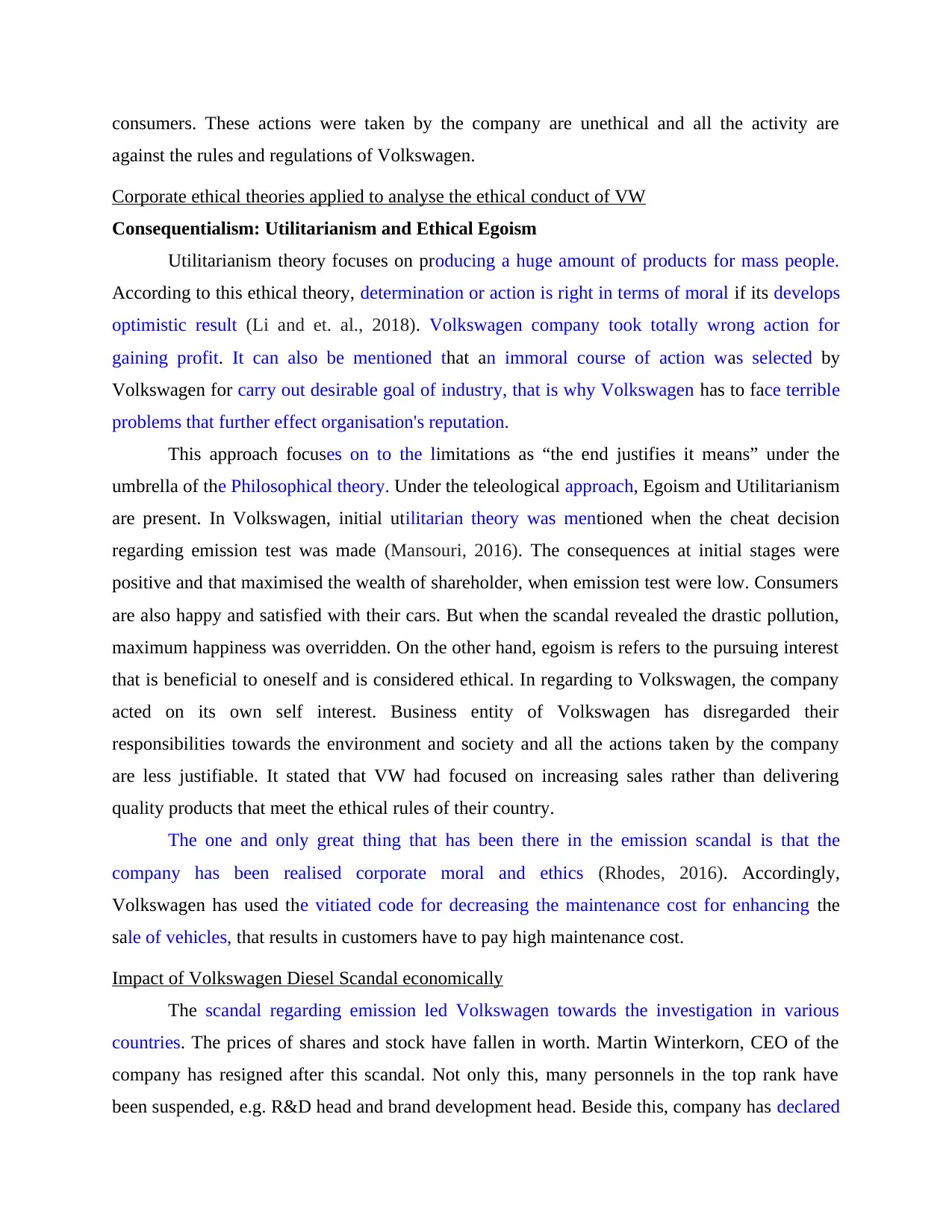
consumers. These actions were taken by the company are unethical and all the activity are
against the rules and regulations of Volkswagen.
Corporate ethical theories applied to analyse the ethical conduct of VW
Consequentialism: Utilitarianism and Ethical Egoism
Utilitarianism theory focuses on producing a huge amount of products for mass people.
According to this ethical theory, determination or action is right in terms of moral if its develops
optimistic result (Li and et. al., 2018). Volkswagen company took totally wrong action for
gaining profit. It can also be mentioned that an immoral course of action was selected by
Volkswagen for carry out desirable goal of industry, that is why Volkswagen has to face terrible
problems that further effect organisation's reputation.
This approach focuses on to the limitations as “the end justifies it means” under the
umbrella of the Philosophical theory. Under the teleological approach, Egoism and Utilitarianism
are present. In Volkswagen, initial utilitarian theory was mentioned when the cheat decision
regarding emission test was made (Mansouri, 2016). The consequences at initial stages were
positive and that maximised the wealth of shareholder, when emission test were low. Consumers
are also happy and satisfied with their cars. But when the scandal revealed the drastic pollution,
maximum happiness was overridden. On the other hand, egoism is refers to the pursuing interest
that is beneficial to oneself and is considered ethical. In regarding to Volkswagen, the company
acted on its own self interest. Business entity of Volkswagen has disregarded their
responsibilities towards the environment and society and all the actions taken by the company
are less justifiable. It stated that VW had focused on increasing sales rather than delivering
quality products that meet the ethical rules of their country.
The one and only great thing that has been there in the emission scandal is that the
company has been realised corporate moral and ethics (Rhodes, 2016). Accordingly,
Volkswagen has used the vitiated code for decreasing the maintenance cost for enhancing the
sale of vehicles, that results in customers have to pay high maintenance cost.
Impact of Volkswagen Diesel Scandal economically
The scandal regarding emission led Volkswagen towards the investigation in various
countries. The prices of shares and stock have fallen in worth. Martin Winterkorn, CEO of the
company has resigned after this scandal. Not only this, many personnels in the top rank have
been suspended, e.g. R&D head and brand development head. Beside this, company has declared
against the rules and regulations of Volkswagen.
Corporate ethical theories applied to analyse the ethical conduct of VW
Consequentialism: Utilitarianism and Ethical Egoism
Utilitarianism theory focuses on producing a huge amount of products for mass people.
According to this ethical theory, determination or action is right in terms of moral if its develops
optimistic result (Li and et. al., 2018). Volkswagen company took totally wrong action for
gaining profit. It can also be mentioned that an immoral course of action was selected by
Volkswagen for carry out desirable goal of industry, that is why Volkswagen has to face terrible
problems that further effect organisation's reputation.
This approach focuses on to the limitations as “the end justifies it means” under the
umbrella of the Philosophical theory. Under the teleological approach, Egoism and Utilitarianism
are present. In Volkswagen, initial utilitarian theory was mentioned when the cheat decision
regarding emission test was made (Mansouri, 2016). The consequences at initial stages were
positive and that maximised the wealth of shareholder, when emission test were low. Consumers
are also happy and satisfied with their cars. But when the scandal revealed the drastic pollution,
maximum happiness was overridden. On the other hand, egoism is refers to the pursuing interest
that is beneficial to oneself and is considered ethical. In regarding to Volkswagen, the company
acted on its own self interest. Business entity of Volkswagen has disregarded their
responsibilities towards the environment and society and all the actions taken by the company
are less justifiable. It stated that VW had focused on increasing sales rather than delivering
quality products that meet the ethical rules of their country.
The one and only great thing that has been there in the emission scandal is that the
company has been realised corporate moral and ethics (Rhodes, 2016). Accordingly,
Volkswagen has used the vitiated code for decreasing the maintenance cost for enhancing the
sale of vehicles, that results in customers have to pay high maintenance cost.
Impact of Volkswagen Diesel Scandal economically
The scandal regarding emission led Volkswagen towards the investigation in various
countries. The prices of shares and stock have fallen in worth. Martin Winterkorn, CEO of the
company has resigned after this scandal. Not only this, many personnels in the top rank have
been suspended, e.g. R&D head and brand development head. Beside this, company has declared
Paraphrase This Document
Need a fresh take? Get an instant paraphrase of this document with our AI Paraphraser
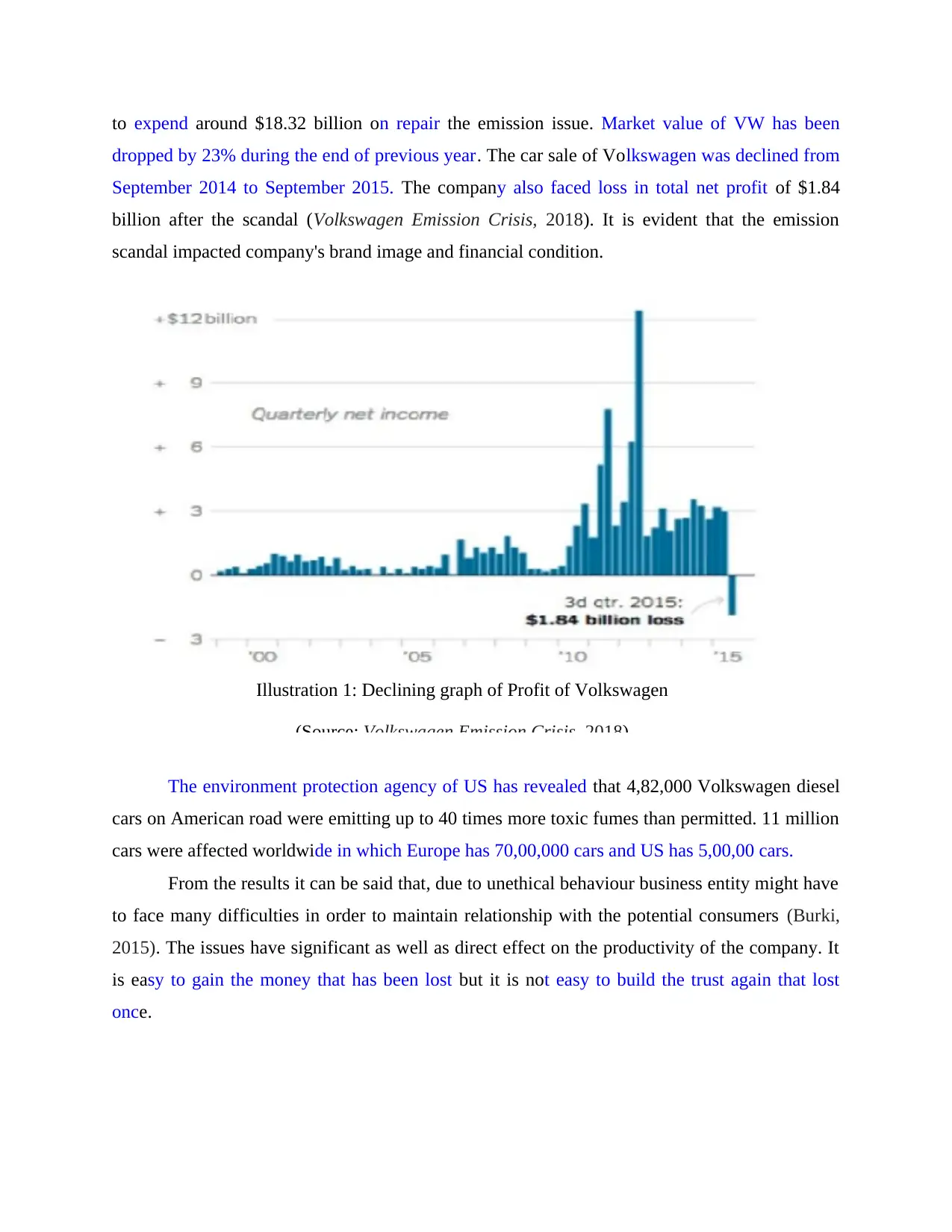
to expend around $18.32 billion on repair the emission issue. Market value of VW has been
dropped by 23% during the end of previous year. The car sale of Volkswagen was declined from
September 2014 to September 2015. The company also faced loss in total net profit of $1.84
billion after the scandal (Volkswagen Emission Crisis, 2018). It is evident that the emission
scandal impacted company's brand image and financial condition.
The environment protection agency of US has revealed that 4,82,000 Volkswagen diesel
cars on American road were emitting up to 40 times more toxic fumes than permitted. 11 million
cars were affected worldwide in which Europe has 70,00,000 cars and US has 5,00,00 cars.
From the results it can be said that, due to unethical behaviour business entity might have
to face many difficulties in order to maintain relationship with the potential consumers (Burki,
2015). The issues have significant as well as direct effect on the productivity of the company. It
is easy to gain the money that has been lost but it is not easy to build the trust again that lost
once.
Illustration 1: Declining graph of Profit of Volkswagen
(Source: Volkswagen Emission Crisis, 2018)
dropped by 23% during the end of previous year. The car sale of Volkswagen was declined from
September 2014 to September 2015. The company also faced loss in total net profit of $1.84
billion after the scandal (Volkswagen Emission Crisis, 2018). It is evident that the emission
scandal impacted company's brand image and financial condition.
The environment protection agency of US has revealed that 4,82,000 Volkswagen diesel
cars on American road were emitting up to 40 times more toxic fumes than permitted. 11 million
cars were affected worldwide in which Europe has 70,00,000 cars and US has 5,00,00 cars.
From the results it can be said that, due to unethical behaviour business entity might have
to face many difficulties in order to maintain relationship with the potential consumers (Burki,
2015). The issues have significant as well as direct effect on the productivity of the company. It
is easy to gain the money that has been lost but it is not easy to build the trust again that lost
once.
Illustration 1: Declining graph of Profit of Volkswagen
(Source: Volkswagen Emission Crisis, 2018)
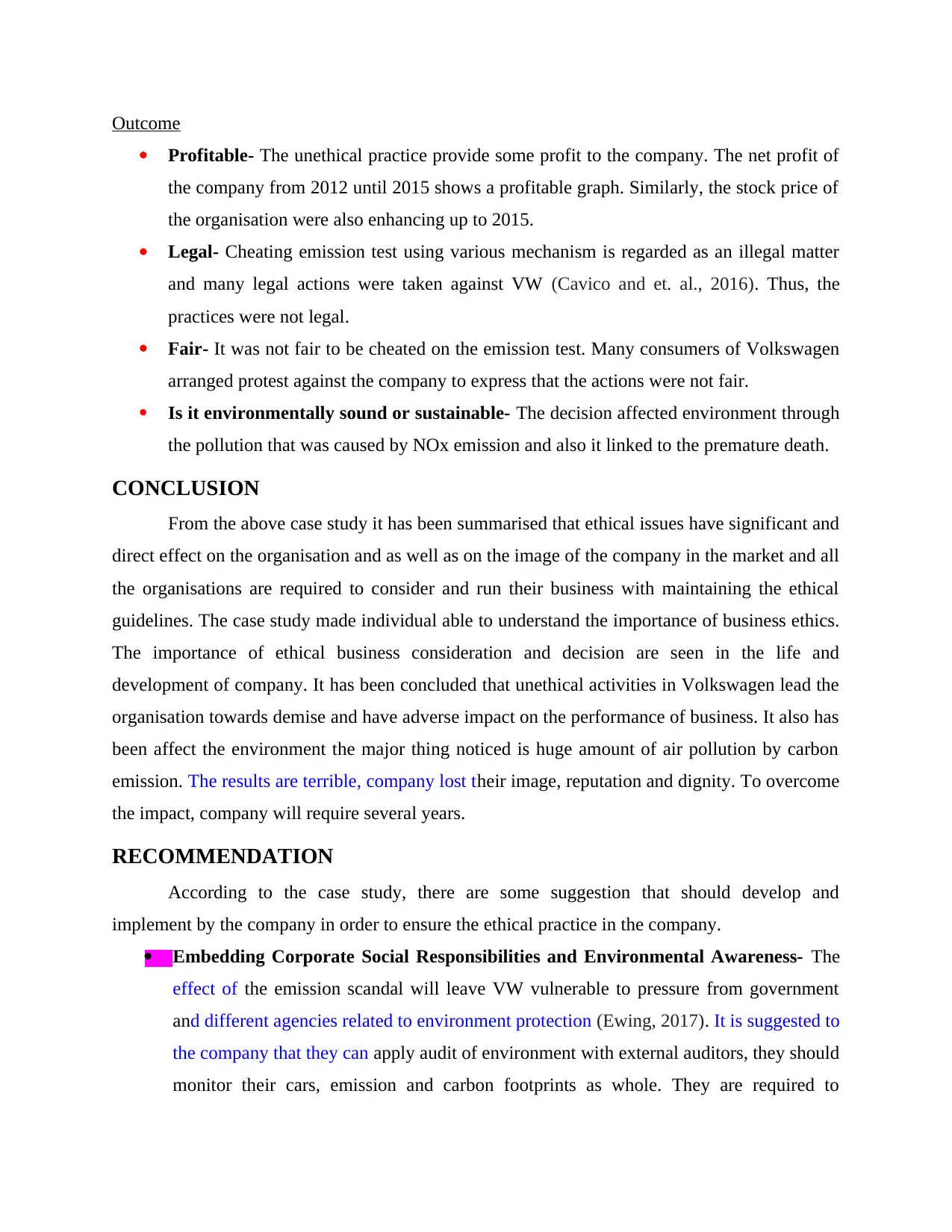
Outcome
Profitable- The unethical practice provide some profit to the company. The net profit of
the company from 2012 until 2015 shows a profitable graph. Similarly, the stock price of
the organisation were also enhancing up to 2015.
Legal- Cheating emission test using various mechanism is regarded as an illegal matter
and many legal actions were taken against VW (Cavico and et. al., 2016). Thus, the
practices were not legal.
Fair- It was not fair to be cheated on the emission test. Many consumers of Volkswagen
arranged protest against the company to express that the actions were not fair.
Is it environmentally sound or sustainable- The decision affected environment through
the pollution that was caused by NOx emission and also it linked to the premature death.
CONCLUSION
From the above case study it has been summarised that ethical issues have significant and
direct effect on the organisation and as well as on the image of the company in the market and all
the organisations are required to consider and run their business with maintaining the ethical
guidelines. The case study made individual able to understand the importance of business ethics.
The importance of ethical business consideration and decision are seen in the life and
development of company. It has been concluded that unethical activities in Volkswagen lead the
organisation towards demise and have adverse impact on the performance of business. It also has
been affect the environment the major thing noticed is huge amount of air pollution by carbon
emission. The results are terrible, company lost their image, reputation and dignity. To overcome
the impact, company will require several years.
RECOMMENDATION
According to the case study, there are some suggestion that should develop and
implement by the company in order to ensure the ethical practice in the company.
Embedding Corporate Social Responsibilities and Environmental Awareness- The
effect of the emission scandal will leave VW vulnerable to pressure from government
and different agencies related to environment protection (Ewing, 2017). It is suggested to
the company that they can apply audit of environment with external auditors, they should
monitor their cars, emission and carbon footprints as whole. They are required to
Profitable- The unethical practice provide some profit to the company. The net profit of
the company from 2012 until 2015 shows a profitable graph. Similarly, the stock price of
the organisation were also enhancing up to 2015.
Legal- Cheating emission test using various mechanism is regarded as an illegal matter
and many legal actions were taken against VW (Cavico and et. al., 2016). Thus, the
practices were not legal.
Fair- It was not fair to be cheated on the emission test. Many consumers of Volkswagen
arranged protest against the company to express that the actions were not fair.
Is it environmentally sound or sustainable- The decision affected environment through
the pollution that was caused by NOx emission and also it linked to the premature death.
CONCLUSION
From the above case study it has been summarised that ethical issues have significant and
direct effect on the organisation and as well as on the image of the company in the market and all
the organisations are required to consider and run their business with maintaining the ethical
guidelines. The case study made individual able to understand the importance of business ethics.
The importance of ethical business consideration and decision are seen in the life and
development of company. It has been concluded that unethical activities in Volkswagen lead the
organisation towards demise and have adverse impact on the performance of business. It also has
been affect the environment the major thing noticed is huge amount of air pollution by carbon
emission. The results are terrible, company lost their image, reputation and dignity. To overcome
the impact, company will require several years.
RECOMMENDATION
According to the case study, there are some suggestion that should develop and
implement by the company in order to ensure the ethical practice in the company.
Embedding Corporate Social Responsibilities and Environmental Awareness- The
effect of the emission scandal will leave VW vulnerable to pressure from government
and different agencies related to environment protection (Ewing, 2017). It is suggested to
the company that they can apply audit of environment with external auditors, they should
monitor their cars, emission and carbon footprints as whole. They are required to
⊘ This is a preview!⊘
Do you want full access?
Subscribe today to unlock all pages.

Trusted by 1+ million students worldwide
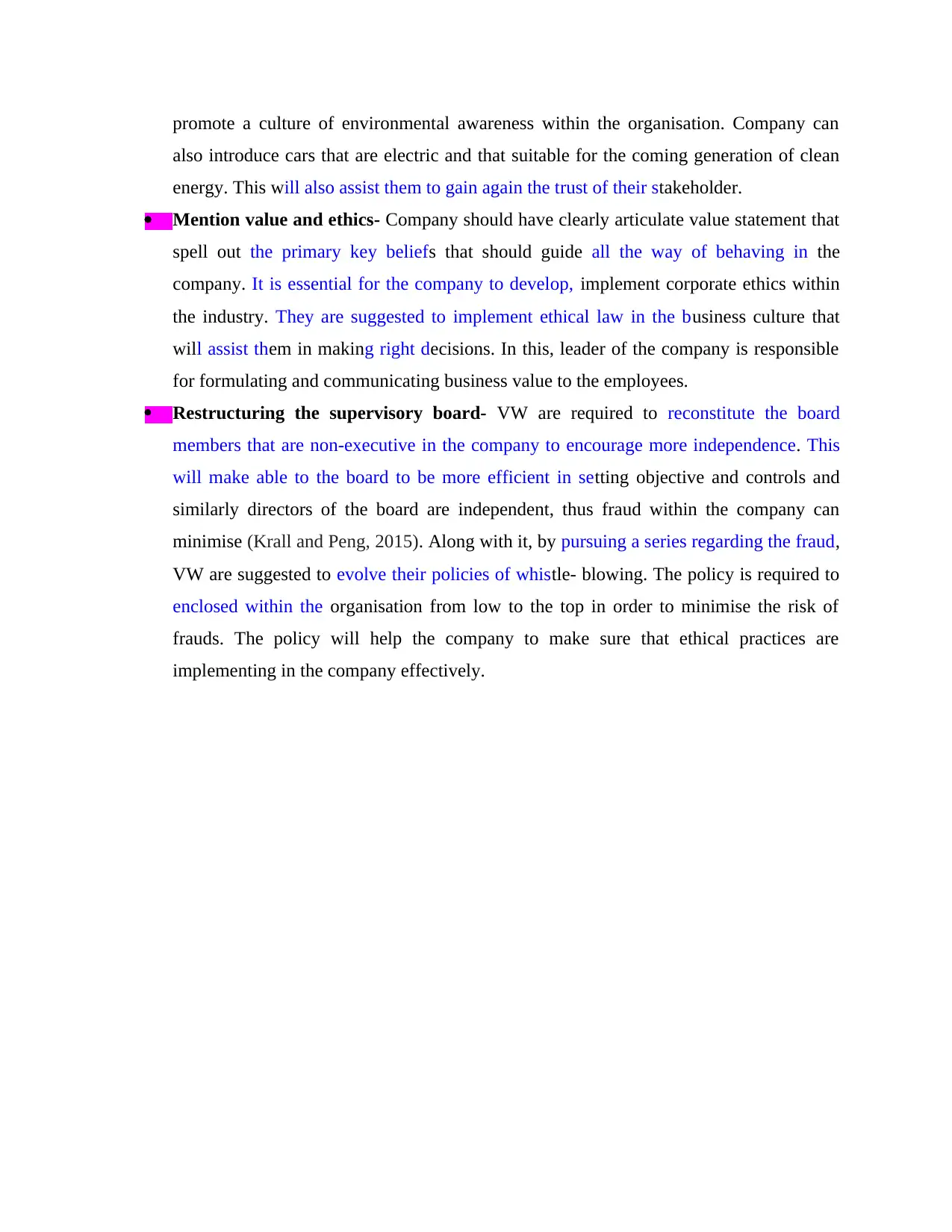
promote a culture of environmental awareness within the organisation. Company can
also introduce cars that are electric and that suitable for the coming generation of clean
energy. This will also assist them to gain again the trust of their stakeholder.
Mention value and ethics- Company should have clearly articulate value statement that
spell out the primary key beliefs that should guide all the way of behaving in the
company. It is essential for the company to develop, implement corporate ethics within
the industry. They are suggested to implement ethical law in the business culture that
will assist them in making right decisions. In this, leader of the company is responsible
for formulating and communicating business value to the employees.
Restructuring the supervisory board- VW are required to reconstitute the board
members that are non-executive in the company to encourage more independence. This
will make able to the board to be more efficient in setting objective and controls and
similarly directors of the board are independent, thus fraud within the company can
minimise (Krall and Peng, 2015). Along with it, by pursuing a series regarding the fraud,
VW are suggested to evolve their policies of whistle- blowing. The policy is required to
enclosed within the organisation from low to the top in order to minimise the risk of
frauds. The policy will help the company to make sure that ethical practices are
implementing in the company effectively.
also introduce cars that are electric and that suitable for the coming generation of clean
energy. This will also assist them to gain again the trust of their stakeholder.
Mention value and ethics- Company should have clearly articulate value statement that
spell out the primary key beliefs that should guide all the way of behaving in the
company. It is essential for the company to develop, implement corporate ethics within
the industry. They are suggested to implement ethical law in the business culture that
will assist them in making right decisions. In this, leader of the company is responsible
for formulating and communicating business value to the employees.
Restructuring the supervisory board- VW are required to reconstitute the board
members that are non-executive in the company to encourage more independence. This
will make able to the board to be more efficient in setting objective and controls and
similarly directors of the board are independent, thus fraud within the company can
minimise (Krall and Peng, 2015). Along with it, by pursuing a series regarding the fraud,
VW are suggested to evolve their policies of whistle- blowing. The policy is required to
enclosed within the organisation from low to the top in order to minimise the risk of
frauds. The policy will help the company to make sure that ethical practices are
implementing in the company effectively.
Paraphrase This Document
Need a fresh take? Get an instant paraphrase of this document with our AI Paraphraser
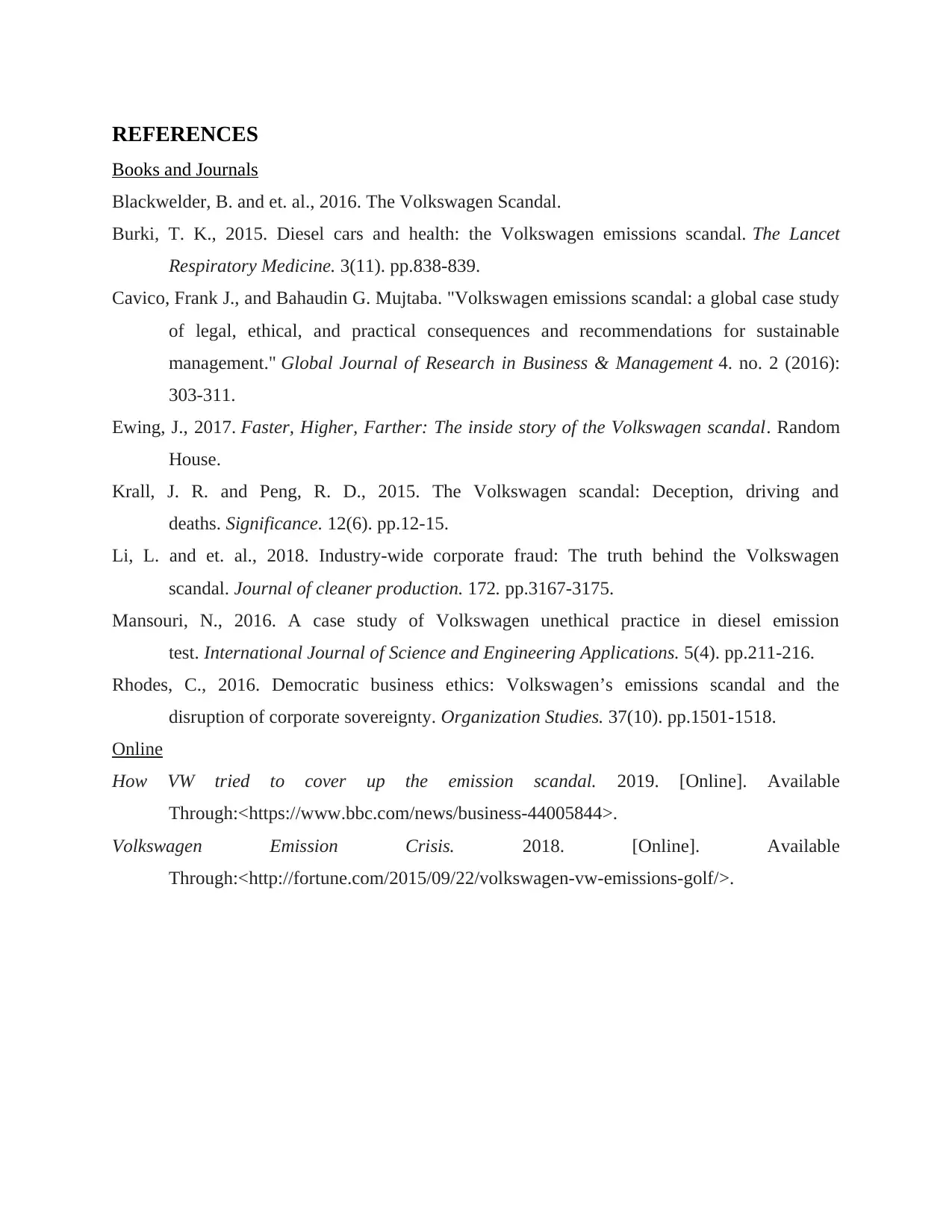
REFERENCES
Books and Journals
Blackwelder, B. and et. al., 2016. The Volkswagen Scandal.
Burki, T. K., 2015. Diesel cars and health: the Volkswagen emissions scandal. The Lancet
Respiratory Medicine. 3(11). pp.838-839.
Cavico, Frank J., and Bahaudin G. Mujtaba. "Volkswagen emissions scandal: a global case study
of legal, ethical, and practical consequences and recommendations for sustainable
management." Global Journal of Research in Business & Management 4. no. 2 (2016):
303-311.
Ewing, J., 2017. Faster, Higher, Farther: The inside story of the Volkswagen scandal. Random
House.
Krall, J. R. and Peng, R. D., 2015. The Volkswagen scandal: Deception, driving and
deaths. Significance. 12(6). pp.12-15.
Li, L. and et. al., 2018. Industry-wide corporate fraud: The truth behind the Volkswagen
scandal. Journal of cleaner production. 172. pp.3167-3175.
Mansouri, N., 2016. A case study of Volkswagen unethical practice in diesel emission
test. International Journal of Science and Engineering Applications. 5(4). pp.211-216.
Rhodes, C., 2016. Democratic business ethics: Volkswagen’s emissions scandal and the
disruption of corporate sovereignty. Organization Studies. 37(10). pp.1501-1518.
Online
How VW tried to cover up the emission scandal. 2019. [Online]. Available
Through:<https://www.bbc.com/news/business-44005844>.
Volkswagen Emission Crisis. 2018. [Online]. Available
Through:<http://fortune.com/2015/09/22/volkswagen-vw-emissions-golf/>.
Books and Journals
Blackwelder, B. and et. al., 2016. The Volkswagen Scandal.
Burki, T. K., 2015. Diesel cars and health: the Volkswagen emissions scandal. The Lancet
Respiratory Medicine. 3(11). pp.838-839.
Cavico, Frank J., and Bahaudin G. Mujtaba. "Volkswagen emissions scandal: a global case study
of legal, ethical, and practical consequences and recommendations for sustainable
management." Global Journal of Research in Business & Management 4. no. 2 (2016):
303-311.
Ewing, J., 2017. Faster, Higher, Farther: The inside story of the Volkswagen scandal. Random
House.
Krall, J. R. and Peng, R. D., 2015. The Volkswagen scandal: Deception, driving and
deaths. Significance. 12(6). pp.12-15.
Li, L. and et. al., 2018. Industry-wide corporate fraud: The truth behind the Volkswagen
scandal. Journal of cleaner production. 172. pp.3167-3175.
Mansouri, N., 2016. A case study of Volkswagen unethical practice in diesel emission
test. International Journal of Science and Engineering Applications. 5(4). pp.211-216.
Rhodes, C., 2016. Democratic business ethics: Volkswagen’s emissions scandal and the
disruption of corporate sovereignty. Organization Studies. 37(10). pp.1501-1518.
Online
How VW tried to cover up the emission scandal. 2019. [Online]. Available
Through:<https://www.bbc.com/news/business-44005844>.
Volkswagen Emission Crisis. 2018. [Online]. Available
Through:<http://fortune.com/2015/09/22/volkswagen-vw-emissions-golf/>.
1 out of 11
Related Documents
Your All-in-One AI-Powered Toolkit for Academic Success.
+13062052269
info@desklib.com
Available 24*7 on WhatsApp / Email
![[object Object]](/_next/static/media/star-bottom.7253800d.svg)
Unlock your academic potential
Copyright © 2020–2026 A2Z Services. All Rights Reserved. Developed and managed by ZUCOL.




